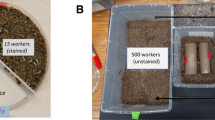Abstract
Pairing termite workers from cultures obtained from same colony of Microcerotermes fuscotibialis Sjostedt did not result in agonistic behavior or mortality of the paired individuals. Termite pairings from different colonies located at different distances resulted in serious encounters and aggressive behavior leading to significant mortality of the individuals. Subtle agonistic behavior was observed when colony mates were reunited after months of separation, but this did not result in any significant mortality. These results confirmed observations of non-overlap of foraging trails of these termites in the field which averts possible encounters and conflict. Therefore these termites are able to recognize their colony mates irrespective of period of separation, a factor for colony affiliation, kinship and recognition.


Similar content being viewed by others
References
Adams ES (1991) Nest-mate recognition based on heritable odors in the termite, Microcerotermes arboreus. Proc Nat Acad Sci 88:2031–2034
Adams ES, Atkinson L, Bulmer MS (2007) Relatedness, recognition errors and colony fusion in the termite, Nasutitermes corniger. Behav Ecol Sociobiol 61:1195–1201
Binder BF (1988) Intercolonial aggression in the subterranean termite, Heterotermes aureus (Isoptera: Rhinotermitidae). Psyche 95:123–137
Bulmer MS, Traniello JFA (2002) Lack of aggression and spatial association of colony members in Reticulitermes flavipes. J Insect Behav 15:121–126
Clement J (1980) Aggression intra- et interspecifique dans le genre Reticulitermes (Isoptera). Sequences comportementales de reconnaissance colonial. Congres sur les Societies d’ Insectes Senangue. Biol Ecol Mediterr 7:157–158
Clement J (1981) Comportement de reconnaissance individuelle dans le genre Reticulitermes (Isoptera). CR Acad Sci Paris serie 111:921–933
Clement J (1986) Open and closed societies in Reticulitermes termites (Isoptera: Rhinotermitidae): Geographic and seasonal variations. Sociobiology 11:311–323
Delaplane KS (1991) Tests for intraspecific agonism in a Louisiana population of Coptotermes formosanus (Isoptera: Rhinotermitidae). J Entomol Sci 26:357–359
Getty GM, Haverty MI, Lewis VR (2000) Agonistic behavior between recently collected and laboratory cultured Reticulitermes spp. (Isoptera; Rhinotermitidae) from northern California. Pan- Pacific Entomol 76(4):243–250
Grace JK (1996) Absence of overt agonistic behavior in a northern population of Reticulitermes flavipes (Isoptera: Rhinotermitidae) from Canada. Sociobiology 28:103–110
Haverty MI, Thorne BL (1989) Agonistic behavior correlated with hydrocarbon phenotypes in dampwood termite, Zootermopsis (Isoptera: Termopsidea). J Insect Behav 2:523–543
Haverty MI, Copren KA, Getty GM, Lewis VR (1999a) Agonistic behavior and cuticular hydrocarbon phenotypes of colonies of Reticulitermes (Isoptera: Rhinotermitidae) from northern California. Ann Entomol Soc Am 92:269–277
Haverty MI, Getty GM, Copren KA, Lewis VR (1999b) Seasonal foraging and feeding behavior of Reticulitermes spp (Isoptera: Rhinotermitidae) in a wildland and a residential location in northern California. Environ Entomol 28:1077–1084
Jones SC (1990) Delineation of Heterotermes aureus (Isoptera: Rhinotermitidae) foraging territories in a Sonoran desert grassland. Environ Entomol 19:1047–1054
King JA (1973) The ecology of aggressive behavior. Ann Rev Ecol Syst 4:117–138
Olugbemi BO (2010) Influence of food on recruitment pattern in the termite. Microcerotermes fuscotibialis. J Insect Sci 10:165
Olugbemi BO, Malaka SLO (1994) Effect of food on recruitment activities in the termite, Microcerotermes fuscotibialis Sjostedt 1896 (Isoptera: Termitidae: Termitinae). J Sci Res Dev 1(1):69–73
Olugbemi BO, Malaka SLO (2007) The effect of food on pheromonal communication in the termite, Microcerotermes fuscotibialis Sjostedt. Afr J Ecol 45(2):216–218
Pearce MJ, Cowie RH, Pack AS, Reavey D (1990) Intraspecific aggression, colony identity and foraging distances in Sudanese Microtermes spp. (Isoptera: Termitidae: Macrotermitinae). Ecol Entomol 15:71–77
Polizzi JM, Forschler BT (1998) Intra- and interspecific agonism in Reticuliterms flavipes (Kollar) and R. virginicus (Banks) and effects of arena and group size in laboratory assays. Insectes Soc 45:43–49
Shelton TG, Grace JK (1996) Review of agonistic behaviors in the Isoptera. Sociobiology 28:155–176
Shelton TG, Grace JK (1997) Suggestion of an environmental influence on intercolony agonism of Formosan subterranean termites (Isopteran: Rhinotermitidae). Environ Entomol 26(3):632–637
Su N-Y, Haverty MI (1991) Agonistic behavior among colonies of the \Formosan subterranean termite, Coptotermes formosanus Shiraki (Isoptera: Rhinotermitidae) from Florida and Hawaii: lack of correlation with cuticular hydrocarbon composition. J Insect Behav 4:115–128
Thorne BL (1982) Termite-termite interactions: workers as an agonistic caste. Psyche 89:133–150
Thorne BL, Haverty MI (1991) A review of intracolony, intraspecific and interspecific agonism in termites. Sociobiology 19:115–145
Author information
Authors and Affiliations
Corresponding author
Rights and permissions
About this article
Cite this article
Olugbemi, B.O. Intra- and Inter-colonial Agonistic Behavior in the Termite, Microcerotermes fuscotibialis Sjostedt (Isoptera: Termitidae: Termitinae). J Insect Behav 26, 69–78 (2013). https://doi.org/10.1007/s10905-012-9336-6
Revised:
Accepted:
Published:
Issue Date:
DOI: https://doi.org/10.1007/s10905-012-9336-6




